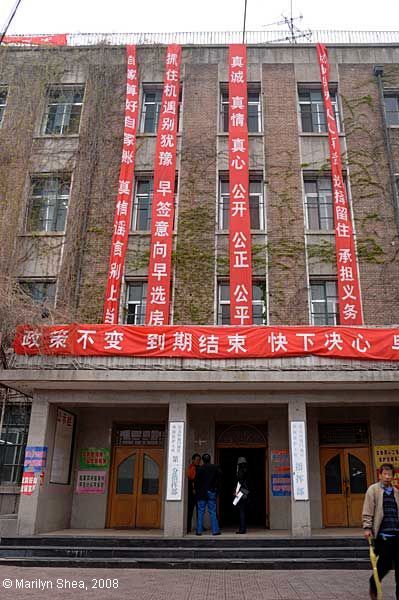 |
| The residents of West Damochang Street 西打磨厂街 (Xīdámóchǎng Jiē) and neighboring streets and lanes in the hutong east of Qianmen Dajie will be moving. The offices that carry out the plans of the resettlement are in this building at the end of the road.
The first banner on the left reads:
The second banner from the left reads:
The third banner from the left continues:
The bottom of the fourth banner on the right reads:
The banner over the door reads:
Rumors. Mr. Wang got a three bedroom apartment, Mr. Li got a room. Why? Mr. Zhang got moving expenses; my cousin had to hire his own carts, why? Some people near the new airport became millionaires, why not us? I heard that... The land grab is one of the toughest problems of modern China, as Mao's peasants are displaced to make room for new factories, shopping centers, redevelopment, dams, and golf courses. In 2004, the Beijing government put in a new rule that developers could no longer deal directly with local governments, village governments. Too many people had been displaced with no comprehensive plan to make sure they could live productive lives. Farmers were offered an apartment or two in a new building if they would give up their traditional home and farmland. The problem was that there was no way to sustain themselves after the resettlement allowance was gone. They had a new apartment, but no job. The farms were gone, the village was gone, and they had nothing to do. Too often the apartments they were offered looked very nice from the outside, but began crumbling as soon as they were occupied. The school population was shifted so rapidly that school fees were increased to help pay for more teachers and expansion. In other places the classrooms were cut in half. If one person had a cousin in the right place, they might make out well. The village leaders could afford to join the golf course, once it was built, and eat in the club restaurant. The rest of the farmers were welcome to become groundskeepers. So, the signs assure fairness, equitability, warm-heartedness. The destruction of the Qianmen area is a multi-million dollar project and in the public eye. With that much money involved, someone is making more than they should, OK, many are. At the same time, the residents are getting new apartments and have locations and features to choose from, but still there is doubt. The few people I talked to don't feel treated unfairly, although becoming a millionaire would be nice, what they feel is grief at the loss of identity and belongingness that accompanies moving from the family home. It is more than that, of course, they are the displaced of the modern era. In China, the concept of the hometown is much stronger than it is for us. People continue to return to their hometown to visit long after their parents die. There is a sense of belonging that is described in their literature and poetry. Even city people have it - those whose families have lived in the same place for hundreds of years. For many of them, moving to another city is unthinkable. When country people come to the city to make money, they send most of it home. They intend to go home at some point when there are more opportunities in their area. The economic downturn in 2008 saw thousands of factories closed or retrenched. The workers packed up and went to their hometowns. There they would have a place, even if they didn't have a family. Someone would help them find day work and another person would know of a place they could live. For the people in the hutongs, they are loosing their hometown. Fortunately, the move has been gradual. People knew that something would happen by the late 1990s. A few began the move early and the neighborhood dissolved rather than imploded. I met people who already had a modern apartment, but chose to stay until the hammers hit the brick. Another woman in an area that will not be touched according to the plan, was offered money to move, but refused. (There is a lot of speculation on the fringe of the government controlled area.) Some of the homes were occupied temporarily by people who rented them cheaply after the resident moved out. They would not be eligible for a new apartment, but enjoyed the neighborhood while it lasted. |
http://hua.umf.maine.edu/China/HistoricBeijing/Qianmen/index.html
Last
update: August 2009
© Marilyn Shea, 2009